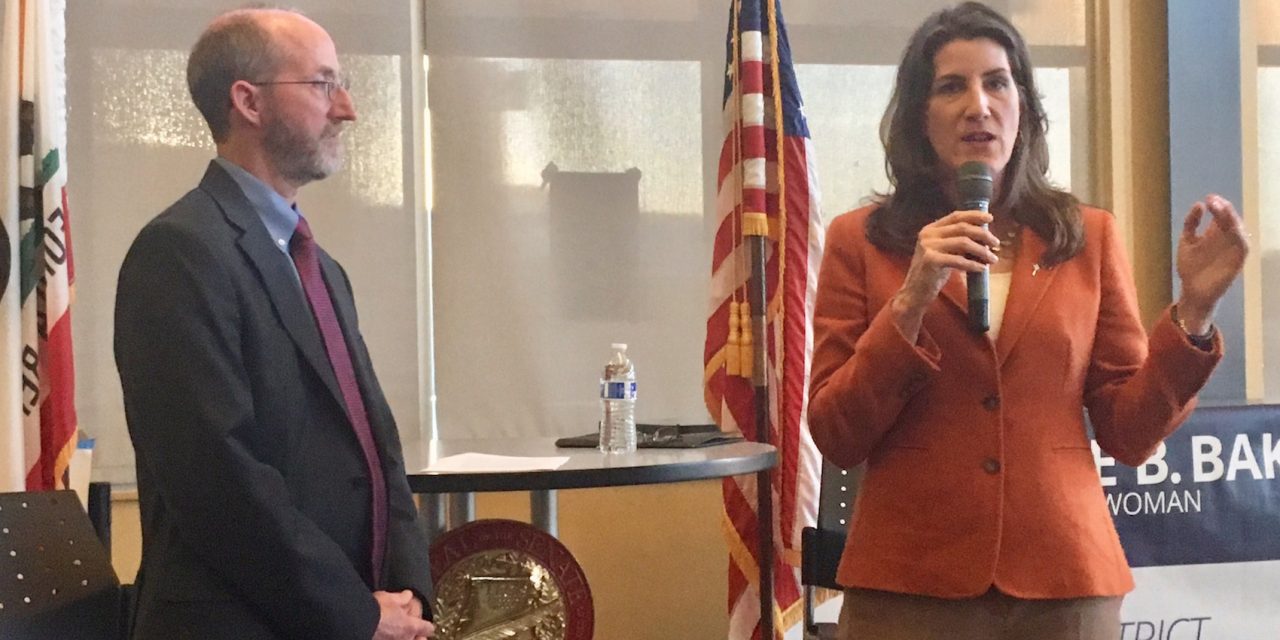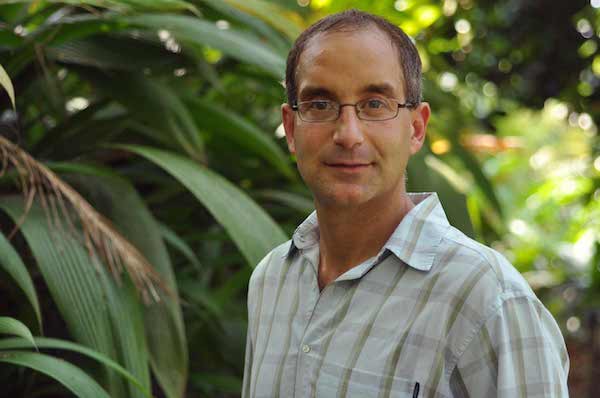Daily Business Report-May 1, 2017
Jacques Chirazi has managed the city of San Diego’s Cleantech Initiative since its inception in 2007. (Photo courtesy of UCSD)
Clean-Tech Czar
As point person for San Diego’s Cleantech Initiative, UC San Diego
alumnus Jacques Chirazi has steered city’s strides in sustainability
By Sarah Pfledderer | UCSD News Center
Electric vehicle owners have someone to thank the next time they put their car in park under a solar-powered charging station at the San Diego Zoo. It’s the same person who launched the region’s first-ever electric car sharing program a few years ago.
Beyond the roadways, he’s also one of the people San Diegans can thank for having approximately 335 more clean technology employer prospects to earn a paycheck from than they did a decade ago.
His name is Jacques Chirazi and he has managed the City of San Diego’s Cleantech Initiative since its inception in 2007. A 2004 graduate from the UC San Diego School of Global Policy and Strategy, Chirazi basically holds the chisel that sculpts San Diego’s strides toward sustainability.
Looking back to his start in nearly a decade ago, Chirazi explained: “I was hired to help create and foster growth of the local clean-tech cluster in San Diego. It was something totally new for the city.”
Chirazi was tasked with making the vision put forth by former San Diego Mayor Jerry Sanders a reality. Drawing from what he learned at UC San Diego about the power of working in teams, he called on university members, nonprofit leaders and personnel from trade organizations to make the endeavor a citywide labor of love.
San Diego’s clean-tech cluster at the time was about 115 companies with a focus on manufacturing, and research and development pertaining to technologies such as smart grids, wind power, biomass and biofuel.
Today, there are roughly 450 companies comprising the cluster. As well, San Diego stands among the most sustainable cities in the United States, ranking No. 3 in the nation for clean-tech leadership and No. 1 in the nation for solar installations, Chirazi said.
Since checking this big box, Chirazi’s responsibilities have broadened to focus on growing San Diego’s “innovation economy” and bolstering biotech, cybersecurity, robotics and startup ecosystems, among other small projects—like in February when he and Mayor Kevin Faulconer unveiled the city is doubling down on its electronic vehicle infrastructure.
What remains consistent about Chirazi’s role, however, is that it is the perfect pairing of his business and consulting background with an education from the School of Global Policy and Strategy.
“When I graduated, I wanted to work in environmental policy,” Chirazi recalled. “Prospects were limited at the time.”
Ultimately, he entered into and held a successful career in consulting at Bainbridge, but never shook his hunger for having a hand in environmental policy. Which is why, when a former faculty member alerted him that the City of San Diego was hiring for his current position, Chirazi jumped at the opportunity.
____________________
Short-Term Rental Hosts Beware:
City Going After delinquent lodging taxes
Even as confusion still reigns over whether short-term rentals are legal in San Diego, the city plans to step up its efforts to collect back lodging taxes from home-sharing hosts, whether they’re renting out a spare bedroom or multiple properties at the beach.
While the City Treasurer’s Office continues to audit, as it has the last several years, Airbnb and other short-term rentals to ensure payment of the city’s 10.5 percent transient occupancy tax, it says it needs more resources to help keep pace with the explosive growth of vacation rentals.
— San Diego Union-Tribune
____________________
SDSU Fundraising Campaign Raises
$800 Million; $50 Million Over Goal
San Diego State University’s campus-wide fundraising campaign has come to a close, raising $800 million or $50 million over its goal.
“The campaign has changed every corner of the SDSU campus and impacted our entire university community,” said SDSU President Elliot Hirshman. “It has laid a stronger financial footing for the entire university and created a culture of philanthropy that is critical to the university’s success today and into the future.”
The university launched The Campaign for SDSU in July 2007 with a goal to raise $500 million to benefit students, faculty and staff. That goal was increased to $750 million in 2014.
Campaign funding supports scholarships, endowed professorships, academic programs, new campus buildings, athletics and KPBS.
SDSU received 138 gifts of $1 million or more. Among the most notable gifts of the campaign are a $25 million endowment from Ron and Alexis Fowler to support programs within the newly renamed Fowler College of Business and a $20 million scholarship endowment created by the late Conrad Prebys to support at least 200 students annually. The Fowlers’ most recent gift was established as a matching gift, which challenges the university and its supporters to raise an additional $25 million for the Fowler College of Business.
____________________
Condor Airlines to Launch
Nonstop Flights to Germany
Condor Airlines on Tuesday launches its nonstop flight to Frankfurt, Germany from San Diego. The new route serves to connect students, businesses and tourists in both destinations.
Germany is considered one of the most important foreign markets to the San Diego region, ranking:
- 4th in terms of foreign employment in San Diego in 2015.
- 2nd in terms of investment from all of Europe in Q1 2017.
- 7th in terms of total exports from San Diego in 2013.
____________________

Purple Reign: Two Legislators from
Opposite Parties Host Town Halls Together
By Laurel Rosenhall | CALmatters
It was not your typical town hall. A Democrat and a Republican stood side by side at the front of a high school auditorium, not to debate but to show voters where they agree. The evening began with the Democrat touting his recent vote against a tax increase and ended with the Republican inviting everyone to join her on a hike to celebrate Earth Day.
Welcome to the center of California’s political spectrum.
The right-leaning Democrat, Sen. Steve Glazer, and the left-leaning Republican, Assemblywoman Catharine Baker, represent overlapping suburban districts some 40 miles east of San Francisco. Once opponents who ran for the same seat (she won), the pair have forged an unusual bipartisan alliance driven by their centrist approach to politics.
Both lawmakers have broken from their parties on landmark issues—Glazer opposing the recent gas-tax increase Democratic leaders pushed to fund road repairs and Baker supporting a climate change bill that all other Republicans opposed. They co-sponsor some of each other’s bills and have made joint town hall meetings a habit, hosting 10 of them over the last two years.
“We want to work together on solutions and set a tone and try to be constructive,” Baker told roughly 200 constituents gathered last week at Dublin High School. “We are not (in the Legislature) to be partisan talking heads.”
Not that they agree on everything. Baker voted against increasing the minimum wage to $15 an hour, a bill Glazer ultimately supported. Glazer voted for a bill that would make California a so-called “sanctuary state” by barring local law enforcement from helping federal immigration authorities—and although Baker has yet to vote on the bill, she sounded wary of it at the recent town hall.
Still, Baker, a cool-under-pressure attorney who values small government and free markets, and Glazer, a longtime Democratic operative with a penchant for bow ties, usually vote the same way. Both represent a stretch of mostly white, well-to-do suburbs in Contra Costa and Alameda counties, and both of them have benefitted from significant campaign spending by charter school advocates and business interests.
Their atypical alliance is due, in part, to changes voters approved to California’s political system. In 2011, California switched to an open primary that allows two candidates from the same party to face off in the general election. A year later, new term limits took effect, allowing legislators to stay in the same office for up to 12 years—double the time previously allowed in the Assembly.
The changes have hardly triggered a bipartisan chorus of kumbaya across the state. But they have nudged the political landscape enough to create, in Baker and Glazer, a bipartisan partnership at the center of the political spectrum.
The open primary was meant attract more centrist candidates from both parties by allowing the two candidates garnering the most votes to advance to the general election, regardless of their party affiliation. The new system made a big difference for Glazer, whose anti-union positions made him an enemy of organized labor.
“If you run not just thinking ‘I have to be the best Democrat,’ it means you run saying ‘How can I occupy the center?’” he said.
The goal becomes appealing to Republicans, Independents and Democrats—a tactic that worked when Glazer squared off against a Democrat backed by labor unions in his 2015 race for state Senate. Glazer argued during the campaign that he wanted to change the law so that Bay Area Rapid Transit workers are not allowed to strike, a proposal he’s still pushing in the face of union opposition.
His tack to the right came after a long career working closely with Democratic Gov. Jerry Brown. He managed Brown’s gubernatorial campaign in 2010 and helped Brown pass the Proposition 30 tax increase in 2012 with strong support from organized labor. But their relationship appears to have soured—Brown did not endorse Glazer in his legislative campaign, and Glazer crossed Brown by voting against the governor’s gas tax increase.
He won his Senate seat a year after losing an Assembly race against Baker and a more liberal Democrat. Glazer finished in third place, then made the unusual move of endorsing Baker in the run-off. Republicans make up just 29 percent of the district, but Baker was able to win by attracting support from moderate Democrats and nonpartisan voters.
The rightward drift of Glazer irritates traditional Democrats who enjoy overwhelming control of the state Capitol. State Senate leader Kevin de Leon and party chairman John Burton declined to comment for this story. Steve Smith, a spokesman for the California Labor Federation, which represents unions that backed unsuccessful opponents against both Glazer and Baker, questioned whether their partnership is genuine.
“I wouldn’t call either one of them a centrist,” Smith said. “I would call both of them political opportunists.”
“Baker tries to positions herself as a Democrat on many issues and Glazer… (campaigned) toward Republican voters because he knew he needed those to win his election. But then you try to figure out ‘What do these folks really stand for?’ And that becomes really unclear.”
Crossing party lines is more acceptable to Republican leaders in Sacramento, who recognize that the GOP is simply too small in California to get anything done on its own. Republicans hold less than one-third of seats in the Legislature and not a single statewide office. So for the Assembly’s Republican leader, the relationship between Baker and Glazer is something to celebrate.
“I would suggest that others should do the same thing,” said Assemblyman Chad Mayes of Yucca Valley. “This idea that we can’t talk to one another is just ridiculous.”
The switch to longer term limits is making things friendlier in the state Capitol, another factor at play in the relationship between Baker and Glazer. Under the old system—where lawmakers were limited to six years in the Assembly and eight in the Senate—politicians began positioning themselves for a run for higher office nearly as soon as they were elected. Under the new system—knowing they can stay in place for up to 12 years—legislators are building deeper relationships with each other. The idea that they could be working together for many years is one reason Baker said she’s pursued the partnership with Glazer.
Constituents at the town hall reacted well to their joint presentation—the mood was overwhelmingly civil and punctuated by occasional rounds of applause. “I feel that these two are doing a good job for us,” said Sheila Cotter, a retiree who lives in Pleasanton and is registered to vote without a party affiliation. “They’re working on real issues that are substantive.”
____________________
Personnel Announcements
Diane Giuliani Appointed a Senior VP of Cubic

Cubic Global Defense, a business unit of Cubic Corporation, announced the appointment of Diane Giuliani as senior vice president of global business development and strategy. In this new role, Giuliani will be responsible for global business development efforts across the CGD business, including the implementation and execution of business strategies that align with Cubic’s overall long-term strategy.
Prior to joining Cubic, Giuliani was the senior vice president of business operations at Textron Systems, where she led the capture of strategic business opportunities. In addition, Giuliani served as the senior vice president and general manager of TRU Simulation and Training, where she managed the integration of four separately acquired companies to form TRU and built a pilot training business for Textron aviation products. Also while at Textron, Giuliani served as senior vice president and general manager of a logistics and technical services business focused on unmanned systems, land vehicle products and training simulators for military aviation platforms.
____________________
Governor Makes Appointments
to Scientific Guidance Panel
Jose Suarez, 37, of Encinitas, has been appointed to the California Scientific Guidance Panel by Gov. Brown. Penelope Quintana, 58, of San Diego, was reappointed to the panel.
Suarez has been an assistant professor at the University of California, San Diego since 2013. He was a post-doctoral fellow at the University of Minnesota from 2010 to 2013, where he was a research assistant from 2006 to 2013. Suarez earned a Doctor of Medicine degree from the University of San Francisco, Quito and Doctor of Philosophy and Master of Public Health degrees in epidemiology from the University of Minnesota.
Quintana has served on the panel since 2013. She has been a professor of public health and environmental health at the San Diego State University Graduate School of Public Health since 2014, where she has held several positions since 1995, including graduate adviser for the Master of Public Health and global health Doctor of Philosophy degree programs and associate and assistant professor. She was an assistant professor at the University of British Columbia from 1992 to 1994.
The positions do not require Senate confirmation and there is no compensation. Both Suarez and Quintana are Democrats.



